Growing so much: More and more urban farms sprouting in Lansing
LANSING — Andrez Chuney didn't plan to own his own farm, but in a spur-of-the-moment decision he pitched the idea to his friend.
"It was kind of one of those conversations where we're hanging out one day and I was like 'Yo, I'm trying to be on like that homestead vibes, like let's get some land,'" Chuney, who lives in Lansing, said.
Chuney, 25, and a friend leased a parcel of land from the Ingham County Land Bank in the spring of 2023. Their lot is 28-feet wide and 111-feet long and located on South Francis Avenue in the Eastside Neighborhood.
He is far from the only one who took the plunge into the world of urban farming in Lansing, especially within the last few years. Lansing is a unique place for farmers, said Cody Mohr, Garden Program coordinator at the Ingham County Land Bank. Programs across the city make it easier for people to start their own gardens and farms within Lansing's boundaries without spending a lot of money, which has led to more green spaces across the city.
Urban farming is a growing trend across part of Michigan and the country, and contributes 15% to 20% of the world's food supply, according to the U.S. Department of Agriculture.
Self-sustainability is a major driver of the efforts, local farmers and the USDA said, but there are plenty of other factors driving growth. Among them: As grocery store prices soar, people are looking for other avenues to obtain fresh, organic produce and vegetables. Additionally, local farmers said they see growing produce as a way to give back to their communities and strengthening the bonds they have with their neighbors.
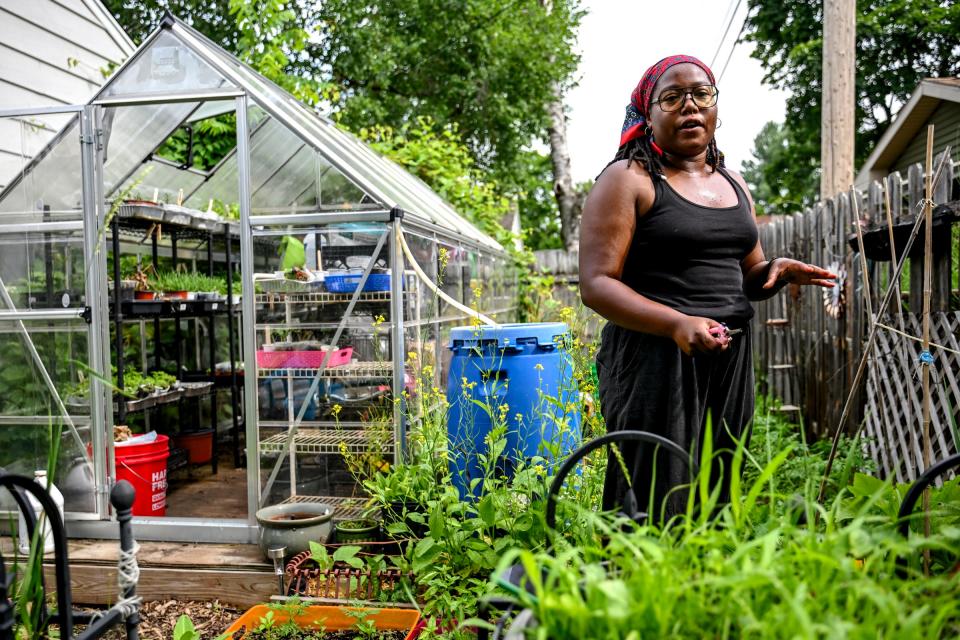
'Nothing like growing your own food'
Hillary Coleman started 1991greenery in Lansing in July 2020. Stuck inside due to pandemic lockdowns, she began growing plants in her basement and shipping them to customers.
"It started as a houseplant nursery out of my basement," Coleman said. "But in 2022, I noticed that (the market) was really saturated. And I was losing money more than making money, especially in the wintertime because by the time people got their plants, they were frozen… So, I made a pivot at the end of 2022."
Coleman, 33, had been gardening for a little over a decade when she decided to make the switch to homesteading, which seemed like the natural transition for her. Her home on Durant Street in Lansing's Westside neighborhood has a decently sized backyard, which now contains her garden, a greenhouse and a chicken coop.
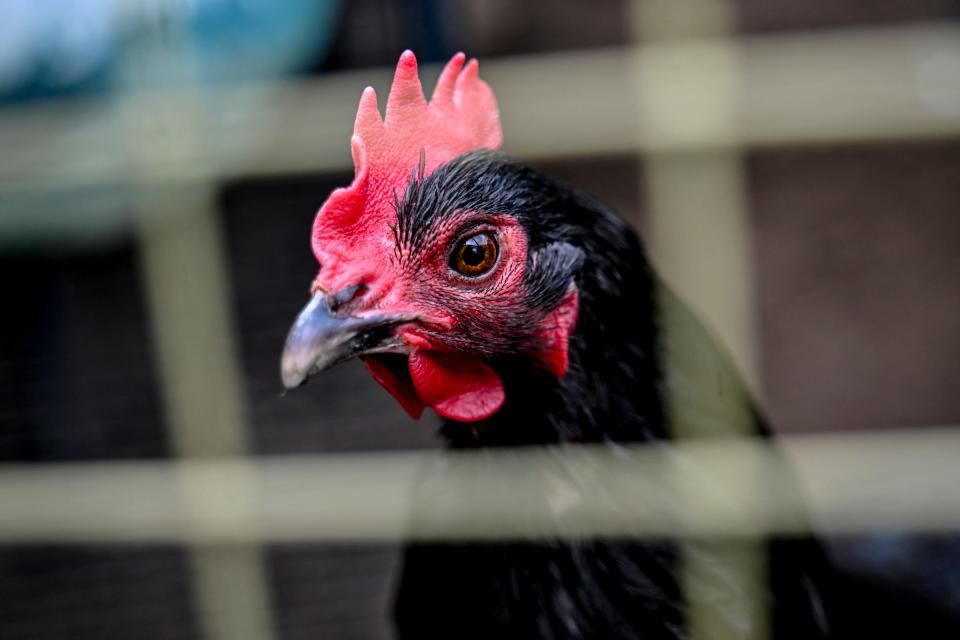
"I started to notice how good I felt doing it, and how peaceful it was," Coleman said. "And there's nothing like growing your own food."
Coleman educates those interested in self-sustainability and growing their own food out of her backyard, and she occasionally teaches at Michigan State University through its extension.
About 70% of her diet comes from her garden. In the summer, she sees harvests of strawberries, herbs, leafy greens, onions, tomatoes and peppers. Recently, she’s begun canning portions of her harvests, so she can have homegrown produce long into the winter.
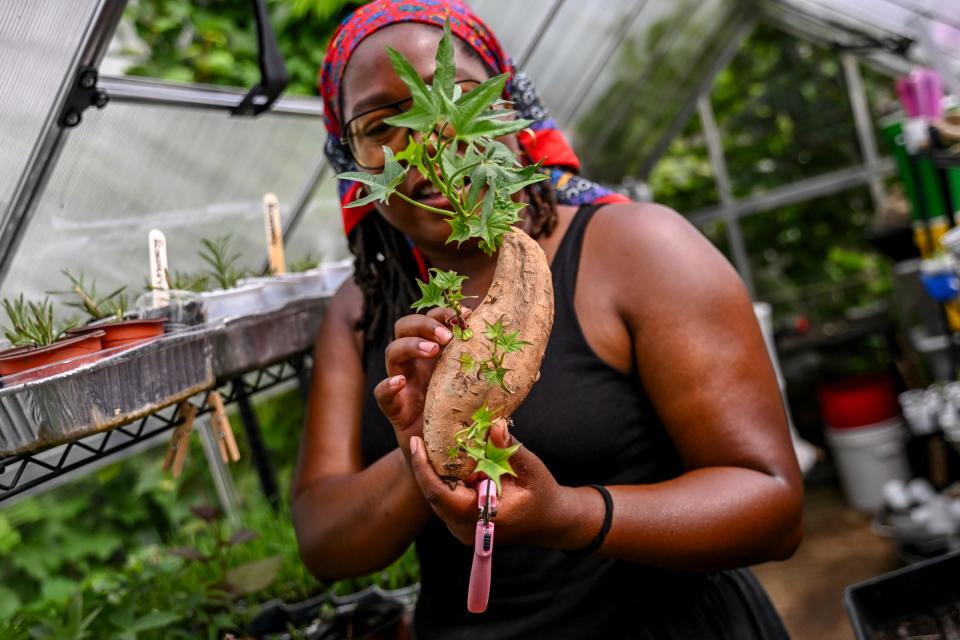
Coleman is fairly involved with Lansing’s gardening community. Three days a week, she volunteers at the Allen Neighborhood Center’s Hunter Park GardenHouse. She said she’s seen more people show an interest in starting their own farms and gardens, and more people wanting to be self-reliant and know exactly where their food is coming from.
"People are tapping into their community gardens and more community gardeners are popping up in more urban spaces, small backyard farms are turning into homesteads…" Coleman said. "I think during the pandemic we all learned that anything can be taken away from us. Things have gone up in price… and it's becoming more of a necessity."
In Lansing, just like any other city, residents are limited by space. Full-size farms cannot thrive within the limits of a city, but Coleman says this shouldn’t be a deterrent for those wanting to start to grow their own food.
"If you have an apartment balcony, you can buy a pot," she said. "And you can buy a packet of seeds and grow on your balcony… It doesn't matter the size of your yard. You just have to have the determination to do so. And like I said, it's becoming a necessity in this time."
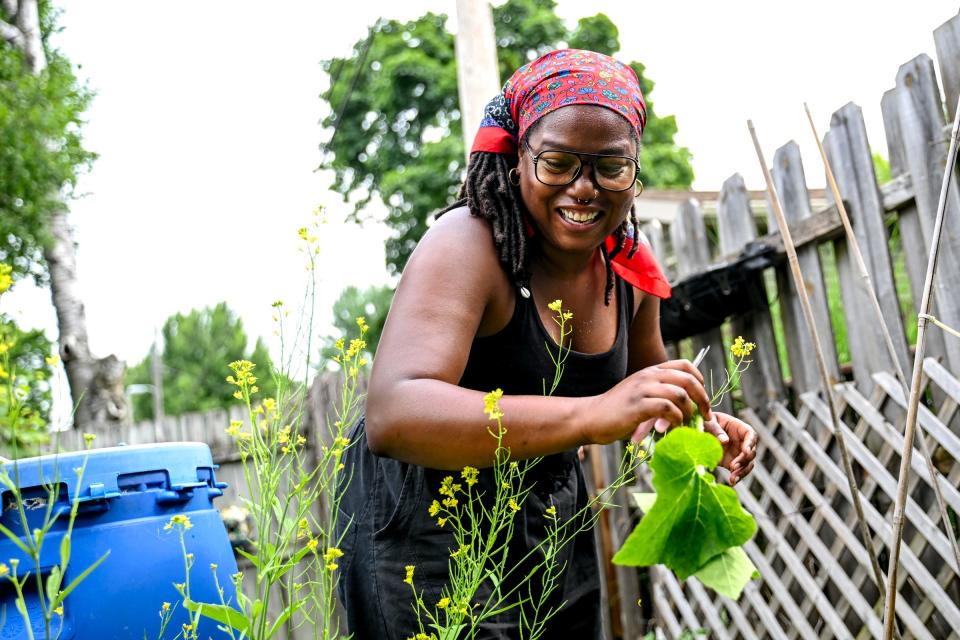
'Getting (produce) in the hands of local consumers'
The Hunter Park GardenHouse is nestled on about 1 acre on Lansing's east side. About half of the land grows food for the Allen Neighborhood Center's Veggie Box, and the other half is a community garden where those living in Lansing can freely pick fruits and vegetables.
"It's all about getting fresh, locally-grown produce into the hands of local consumers," said Tom Martin, the manager of Hunter Park GardenHouse.
Martin said that for some Lansing residents, accessing fresh produce is difficult. Produce is expensive, and not everyone can access the supermarkets on the outer edges of the city. However, local programs like the center’s Veggie Box alongside the influx of farmers markets in the area have helped alleviate some of that need.
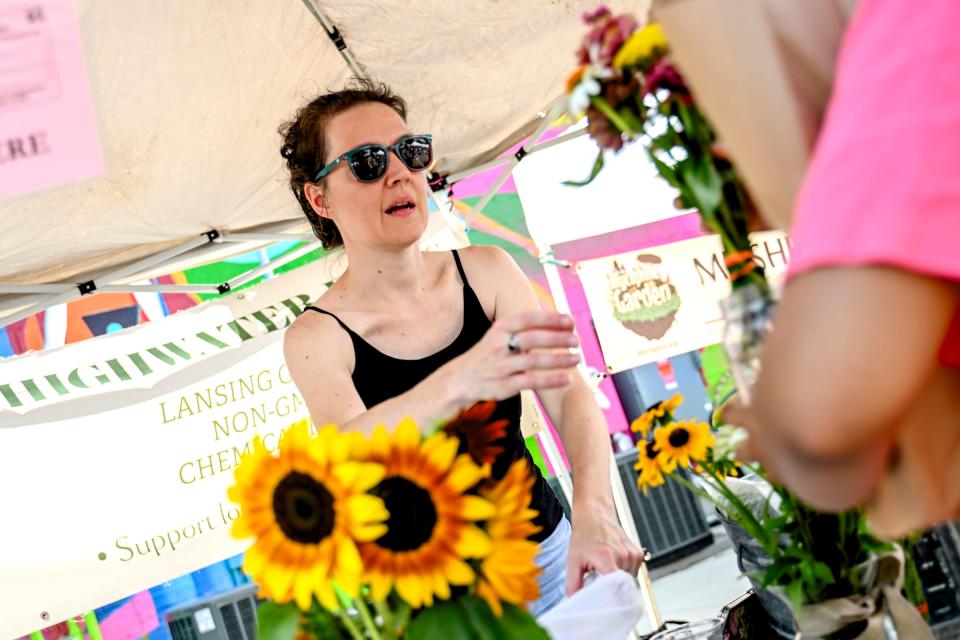
Sarah Browne is one of the urban farmers who grow produce within the city of Lansing and sell produce at the Allen Farmers Market.
She and her husband, Tony, started Highwater Farms in 2017. Due to ongoing health issues, she had to quit her job and decided to begin their own urban farm.
“We wanted something we could work on together,” she said.
Her home in Lansing didn't have enough space for the large-scale farming she wanted to do, and she credits the Ingham County Land Bank with helping her find land that worked for them in Lansing’s eastside. Browne, 40, said her leased lot costs $100 per acre every year.
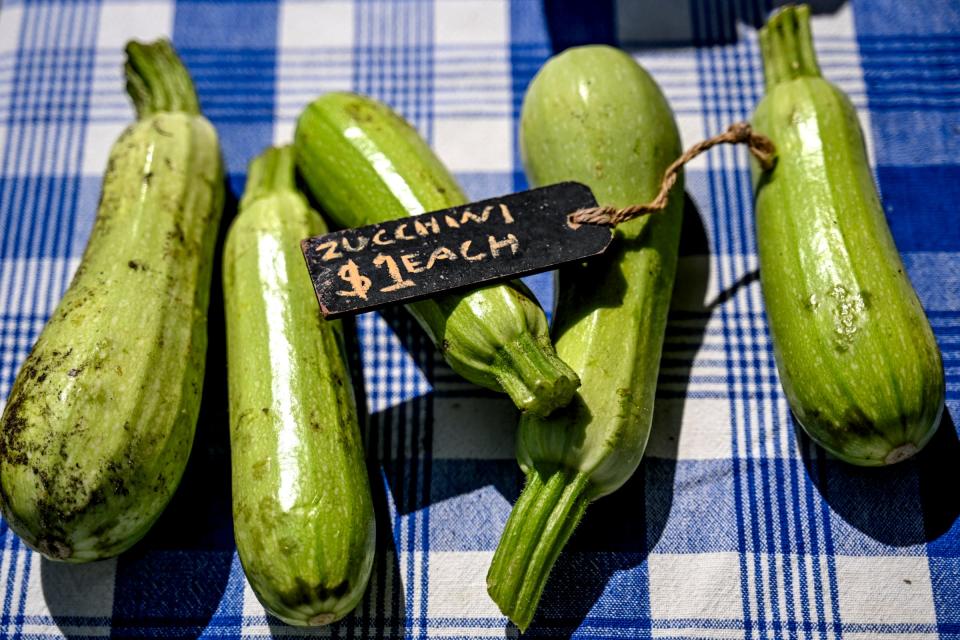
While just getting started, they grew typical farmers market fare, like lettuce and zucchini. But after more and more farms began and more booths opened at local farmers markets, Browne started to diversify the crops she and her husband were growing and selling.
"The urban farming community has absolutely grown so much," Browne said. "More people are getting involved, and that means more diversity of produce people can buy."
Although the increased competition makes it harder for farmers to sell more to customers, Browne has noticed more people looking to buy uncommon produce, some of which she’s started to sell.
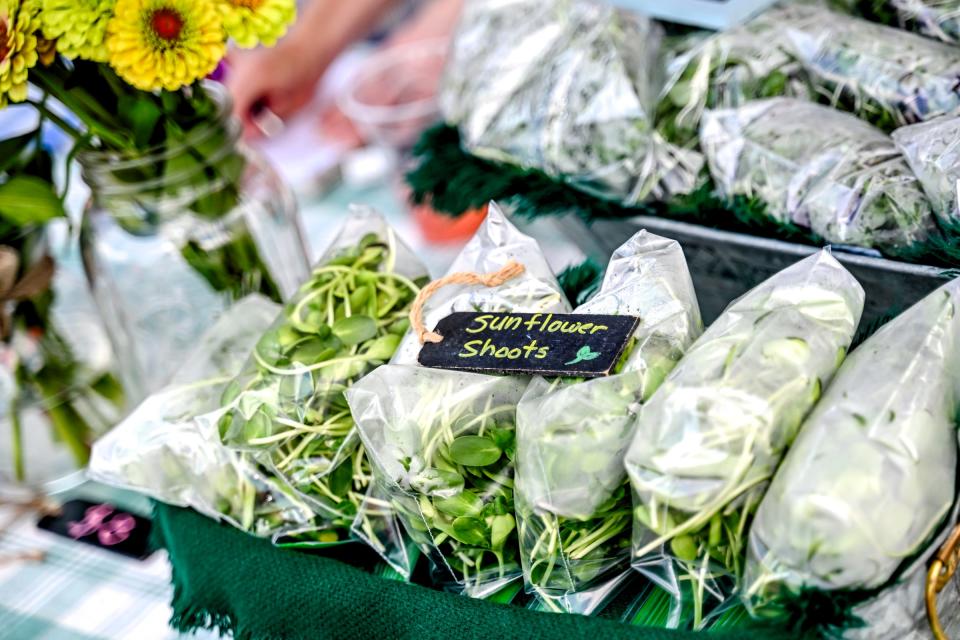
“We’ve started growing microgreens, which has been really cool because we’ve been able to get into retail with them,” she said. “You know, not very many people are selling them so it’s easier to set ourselves apart.”
Outside of farmers markets, local community gardens can provide a space for people to work together to grow produce and access fresh fruits and vegetables.
Martin said the Hunter Park GardenHouse has started to grow more difficult produce and produce that refugees and immigrants from around the world would recognize if they ended up in Lansing. This past spring was the first time the GardenHouse has grown edamame, and plans are to grow other non-native produce like jackfruit in the future.
“(The Hunter Park GardenHouse) isn’t competitive, we’re not selling at farmers markets or trying to make a profit off of what we sell,” Martin said. “So we’ve been able to experiment a little more, and branch out with what we grow.”
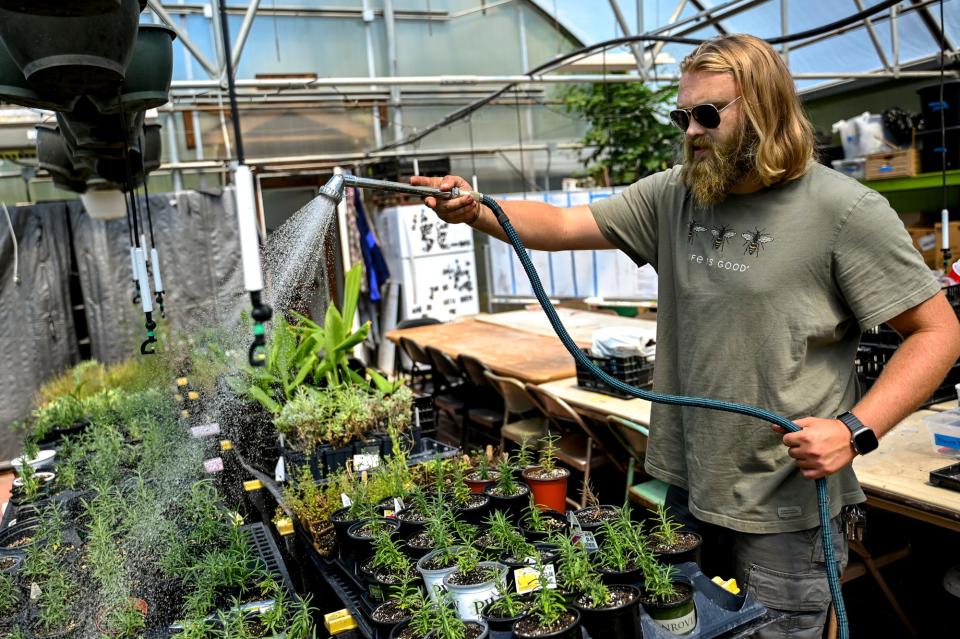
For people looking to start their own farm, Martin recommends determining exactly what they want to do and to seek mentorship from those who own their own farms and gardens.
"You need to determine what you want to grow, what your goals are, why you want to be doing it," he said. "And there's so many gardening groups on Facebook to get connected with other people doing the same thing."
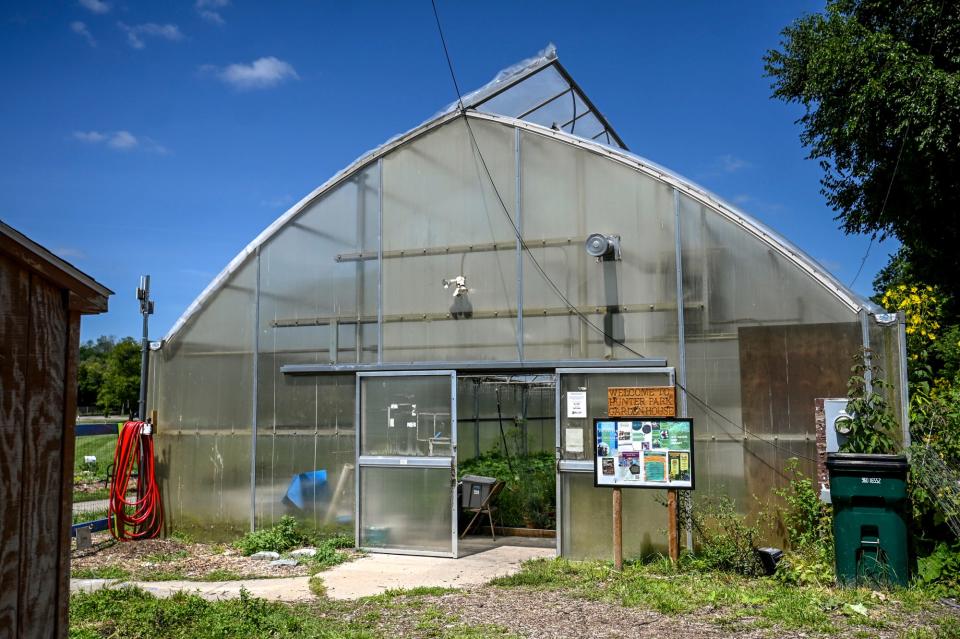
For first-time plant growers Martin recommends a lot of patience.
"Get involved your first season, then fail and learn, and then do it again," he said. "It's a skill you have to learn, and it's always an experiment."
Popularity in Lansing
The Garden Project's website says there are more than 100 urban farms and gardens within the city of Lansing.
"In exchange for a low annual fee and general care of the property, neighbors are provided space in order to beautify their neighborhood," the website says. "The Garden Program also provides soil tests, tilling, compost and plant starts to support community efforts.
"The Land Bank’s Garden Program is committed to providing land to make neighborhood beautification and gardening dreams a reality for our community."
When compared with cities like Detroit, which has more than 2,200 urban farms and gardens, the urban farming scene in Lansing might not seem like much, but it's expanding every year. Mohr said he sees more and more people deciding to lease or buy land from the Land Bank, and credits unique features of Lansing for part of that popularity.
The Garden Program specifically promotes use of the vacant land on Lansing's eastside. Some of these lot are located within the "floodplain," where the Red Cedar River, Grand River and Sycamore Creek meet. This land can't be developed for commercial use, so entrepreneurial urban farmers take priority.
"I think (urban farming) has to keep going at this rate," Mohr said. "For sustainability reasons, societal reasons... And (the Garden Program) is actively working on expanding."
Those interested can browse available properties through the Ingham County Land Bank's database of available properties, and contact Mohr at 517.267.5221 ext. 2386 or cmohr@ingham.org.
Coleman also believes that urban farming in Michigan and especially in Lansing, will become more popular over the next few years.
"Every year, I see more and more farms popping up and more and more farming accounts on Instagram and even just talking to people they'll be like 'Yeah I just started a small garden,'" Coleman said. "I just think it's going to get more and more popular. And I love to see it."
Browne said she does wish more economic incentives were made available for urban farmers, especially those with larger farms within the city. She also wants more retail locations to partner with local farmers in the future, so farmers don't have to rely solely on farmers markets.
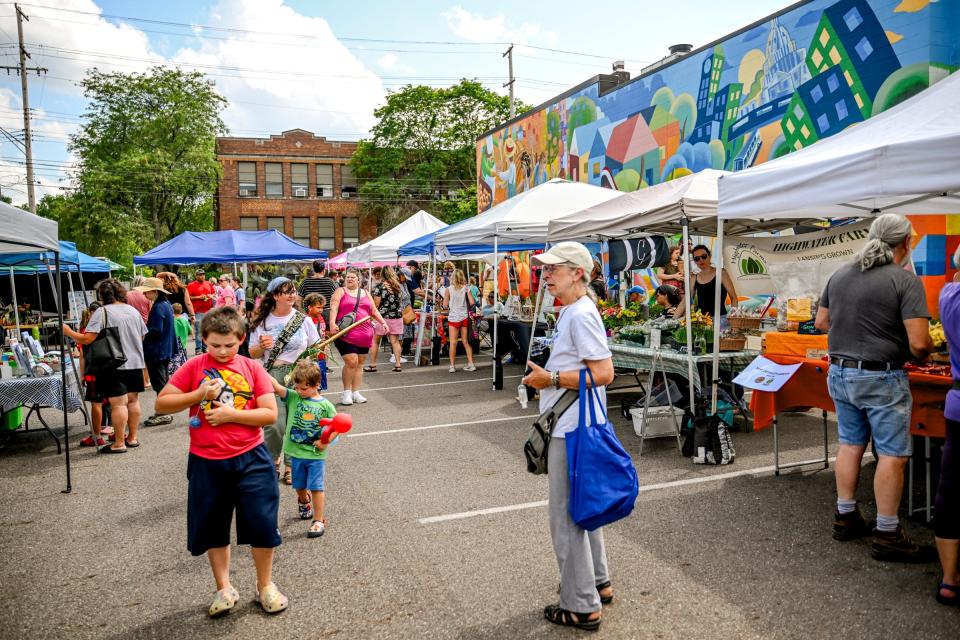
"The more people know what local farmers can offer them, the more resources are given to those farmers," she said. "Lansing already has a lot of great things going for it, but it could be even better."
Chuney will continue farming on his lot in Lansing, and plans to eventually buy the land he currently leases. He said it's important for those with the resources and ability to contribute to a self-sustaining Lansing, and help others access fresh produce who might not have been able to easily before.
"I realized having access to this was a necessity in my life, and I realized that if it was for me, it was for the people in my life," he said.
Martin said he can see all Lansing residents being able to be sustained off of what is grown within the city's limits in just a few years.
"Local food is a solution to so many problems," he said. "The global food supply chain is so fragile... And I'd like to see people being supported so they can grow their own food, and rural areas that are now used for farming returned to natural areas."
Contact Sarah Atwood at satwood@lsj.com or on X @sarahmatwood.
This article originally appeared on Lansing State Journal: Growing so much: More and more urban farms taking root in Lansing

